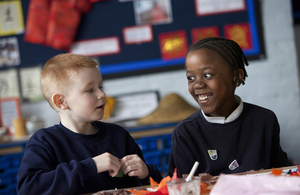Free schools drive social justice: Nicky Morgan
Education Secretary opens the latest window of free school applications.

Children laughing in a classroom
Free schools are the ‘modern engines of social justice’ helping ‘break the cycle of disadvantage’, Education Secretary Nicky Morgan says today (22 May 2015) as she affirms the government pledge to open 500 new free schools this parliament.
Speaking on the day the latest application window for teachers, parents and education experts hoping to open a new school opens, Nicky Morgan said free schools are empowering parents to demand more for their children on a scale never seen before.
The government has committed to opening 500 more free schools in this parliament, equating to 270,000 additional school places in communities across the country. The new schools, on top of the 254 already opened, will meet the growing demand of parents for more excellent local schools with high standards and strong discipline. Research has also shown they are helping to raise standards in neighbouring schools by introducing fresh ideas and competition to local communities.
The government’s education reforms are helping more young people, regardless of their background, to achieve their potential and reach their high aspirations. In the past 2 years the gap in performance between disadvantaged schools and their peers has narrowed at both primary and secondary schools.
Education Secretary Nicky Morgan said:
Free schools are at the heart of the government’s commitment to deliver real social justice by ensuring all pupils have access to a world class education. This is at the core of our commitment to govern as one nation - creating a country where everyone, regardless of their background, can achieve their high aspirations.
Half of all free schools are in the most deprived areas of the country, offering a fresh chance for families to break the cycle of disadvantage by providing a quality of schooling never before seen in many communities.
It is free schools like Dixons Trinity Academy in Bradford, providing an outstanding and innovative education to some of the country’s most deprived children. Or schools like ARK Conway Primary Academy, giving children in Acton the best possible start to life. These are the modern engines of social justice.
Parents want the best for their kids, and where they are unhappy with the schools on offer locally the free school programme empowers them to demand more and establish new, high performing, community-led new schools.
So I’m calling on all high performing schools, sponsors, charities, community groups and parents to come forward with their proposals for new schools and join us in our shared mission of providing every child with a truly world class education.
These brand new schools set up by parents, teachers, charities, academy sponsors and existing schools in response to demand from the local community, either where there is a shortage of places, or where the parents are not happy with the places on offer. So far the programme has resulted in 254 new schools, providing 125,000 places. 72% are located in areas with a shortage of places and half are in the most deprived communities in the country. They are more likely to be rated ‘outstanding’ by Ofsted than other schools.
The free schools programme is also transforming the lives of many of society’s most disadvantaged and disaffected children. 17% of all free schools are dedicated to special needs or alternative provision, giving more help to those most in need.
Through its school reforms the government is taking power away from politicians and bureaucrats and handing it to heads and teachers. More than two thirds of free school heads say they are having a positive impact on schools in their local area - driving up standards and ensuring more parents have a great school in their neighbourhood. Policy Exchange research has also shown that the opening of a free school is associated with improvements in local poorly-performing schools, at the same time as providing an excellent education to the pupils who attend the free schools themselves.
The government’s plan for education includes introducing new powers to tackle failing schools and improve those that are coasting. Two new measures that will give heads the ability to make an immediate start on improving underperforming schools will be confirmed in the Queen’s Speech next week.
Notes to editors
- The department’s new gap index indicates that the performance gap between disadvantaged pupils and their peers is closing at both key stages 2 and 4. At key stage 2, on the current headline measure, the proportion of pupil premium pupils achieving level 4 in reading, writing and maths combined has risen 6 percentage points between 2012 and 2014 - from 61% to 67% - and the gap with non-pupil premium pupils has narrowed by 2 percentage points. Over the same period, the attainment gap index has narrowed by 2%.
- At GCSE the new attainment gap index shows that the gap continues to close - by almost 2% since the previous year.
- Policy Exchange’s ‘A rising tide: The competitive benefits of free schools’ report found that the opening of a free school is associated with improvements in local primary and secondary schools.
- Read further details about opening a free school.
DfE media enquiries
Central newsdesk - for journalists 020 7783 8300